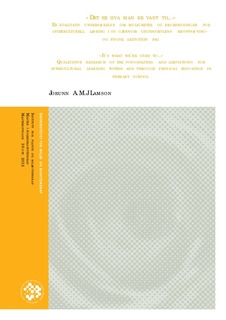| dc.description.abstract | Sammendrag
Barns utvikling vil bære med seg muligheter og begrensninger for læring. Dagens
skoler og elever speiler et flerkulturelt samfunn. Det å forholde seg til mange kulturer kan ha
sine utfordringer. Interkulturell læring (IKL) er å lære om, for og av hverandre slik at vi kan
lære å respektere våre forskjelligheter og håndtere konflikter på et gunstig måte. Med andre
ord ønsker vi at våre elever oppnår interkulturell kompetanse. Øzerks (2008) definisjon på
interkulturell danning og kompetanse korresponderer med Kohlbergs siste nivå i hans teori
om moralsk utvikling. Hensikten med undersøkelsen var å få innsikt i hvilke muligheter og
begrensninger IKL har i en femte og niende klasse ved en utvalgt skole.
Gjennom kvalitative forskningsmetoder, som observasjoner og intervjuer, fikk jeg forske
på hvordan deltakernes samspill og kommunikasjon utartet seg i de flerkulturelle klassene.
Kombinasjonen av lærernes og elevenes utsagn og handlinger i kroppsøvings(kr.øv)- og fysisk
aktivitets(FyA) fagene, gav grunnlag til diskusjon som ble satt i lys av teori og empiri.
Resultatene viste at femte klasse hadde tendenser til å ignorere ubehagelig situasjoner,
og niende klasse skapte sin egen nye «ukultur» for å slippe unna et system som ikke var i
deres interessefelt. Den kvalitative undersøkelsen viser at skjemadannelsen og deres kognitive
utvikling i forhold til moral kan være mer påvirkelig hos femte enn i niende klasse. Elevene
stereotypiserer og forenkler det helhetlige bildet, som er en naturlig reaksjon i følge kognitiv
psykologi. Men denne prosessen kan også påvirke deres innsikt i seg selv og andre. Som igjen
kan ha en innvirkning på det individuelle og den sosiale dannelsen. Men elevene viste
refleksjonsevner under intervjuet, i samspill med hverandre og ved å bli stilt åpne spørsmål.
Undersøkelsen viser at «Det er hva man er vant til..» som former hverdagen, og det
aksepteres at vi forenkler og ignorerer for å slippe ubehaget når vi konfronteres med det som
er «annerledes og fremmed». Kohlbergs teori kan brukes som et veiledende verktøy dersom
man ønsker å innføre IKL i grunnskolens kroppsøvings (kr.øv)- og fysiskaktivitets (FyA) fag.
Slik kan man optimalisere for at læringsmaterialet er på samme nivå som elevene.
De strukturelle forholdene til lærerne er en begrensning i dag. Tverrfaglig arbeid på tvers av
fagene er derfor ønskelig. Dersom treningsprogrammer utvikles innen IKL for grunnskolens
elever kan Kohlbergs stadier være veiledende for hva som kan være muligheter og
begrensninger, og kan gagne i et forebyggende aspekt dersom elever utvikler seg til å bli et
«kritisk menneske» med «flerkulturell forståelse», slik det står i Kunnskapsløftet 2006. Abstract
Child development is characterized by many opportunities and limitations for learning. Today
the schools are represented by a multicultural society. To live in a mix of many cultures can
be challenging. Intercultural learning (ICL) is about learning from, with and about each other,
in order to obtain respect for our differences and cope with corresponding conflicts in a
productive manner. In other words, we would like our pupils to obtain intercultural
competence. Øzerks (2008) definition of intercultural formation and competence corresponds
with Kohlbergs last level on moral development. The purpose of this study was to get an
insight in which opportunities and limitations there where for ICL within the physical
education classes of the chosen fifth and ninth graders at a particular school.
Through qualitative research methods, such as observation and interviews, I got to
research how the interaction and communication generated in these multicultural classes. The
results of the data where discussed in the light of empirical findings and theory based within
cognitive psychology.
The results showed that the fifth graders had the tendency to ignore uncomfortable
situations, and that the ninth graders created their own “uncultured” sphere to escape the
system which was not within their field of interest. The qualitative research shows that
schematic processing and their cognitive development can be easier to influence amongst the
fifth graders than the ninth graders. The pupils stereotype and simplify reality which is a
natural reaction according to cognitive theory. But this process can also impair their insight to
the “self” and others. This again can influence the individual and the social formation. The
pupils showed abilities to reflect during interaction amongst each other and when asked
“open” questions by the interviewer. “What we`re used to..” forms our everyday lives, and it
is accepted that we simplify and ignore to escape uncomfortable situations whenever we are
confronted with “strangeness or what`s different”. Kohlberg’s theory on moral development
can be used to facilitate the concept of ICL in the subject of physical education in elementary
school. In this manner it can help optimize the learning material, and be offered at the same
level as the pupils correspond to within the cognitive stages.
The structural conditions of the teachers’ situation today are a limitation for ICL.
Interdisciplinary cooperation between teachers of different subjects is therefore to
recommend. It is also recommendable to research further in relation to developing training
programs in elementary schools, and to use intercultural learning as a preventive tool. Kohlbergs moral stages can be of help and facilitate in developing the «critical human being»
with «multicultural understandings» as stated in the document Kunnskapsløftet 2006. | no_NO |
